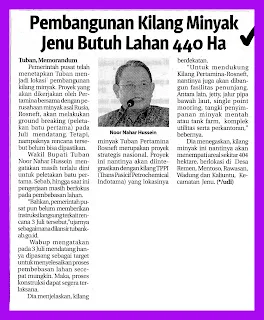Deputy Minister of EMR Arcandra Tahar asked for evidence and data to Pertamina and Medco regarding gross split inequality. The Ministry of Energy and Mineral Resources (ESDM) from January 2017 has amended new contracts in upstream oil and gas, from a profit sharing contract with cost recovery scheme to a contract with a gross split scheme. However, up until now, business actors still doubt the profitability with the gross split scheme.
Some time ago, Director of Operation of Medco Energy, Ronald Gunawan, gross split is no more attractive than contractor contract (KKKS) cost recovery. If gross splits are applied to oil or gas block contracts with high investment profile, the field economy and return on investment are far enough to be spent on cost recovery
On the other hand, Pertamina, which gets the 8th block of terminating oil and gas blocks in 2018 with a gross split scheme until now also still recalculate the economy of the ten blocks of oil and gas.
Even Pertamina stated that Offshore North West Java (ONWJ) Block using gross split requires additional profit sharing to be economical. "While we are evaluating, we are requesting until June to submit officially (about 8 oil and gas blocks) to the Government," said Gunung Sardjono Hadi President Director of PT Pertamina Hulu Energi (PHE)
Meanwhile, Executive Director of Indonesia Petroleum Association (IPA), Marjolijn Wajong said, based on IPA evaluation, if without significant efficiency, gross split is not so attractive contracts that use cost recovery. Therefore it should be discussed clearly between the Contractor of Cooperation Contract (KKKS) and the government to make a great efficiency including the many and the many licenses between the Ministries.
Therefore, IPA proposes that KKKS if the opinion that gross split is not interesting should discuss formally using actual data with the Ministry of Energy and Mineral Resources. "In order to make an agreement to make the contract attractive.
Request evidence and data
Deputy Minister of Energy and Mineral Resources Arcandra Tahar as the initiator of gross split is actually open to change the gross split scheme if it is proven that the scheme is not economical. However, to date there is not a single KKKS stating the gross split scheme is not economical. Therefore, the government has no plans to change the gross split scheme. "There is no proof, no how to change it?" There is no proof, "Arcandra said on Monday (29/5).
Even Pertamina who get the right of Block ONWJ and stated that the need for additional profit sharing until now has not also submitted the proposal of calculation of revenue-sharing to the Government. Including incoming about 8 blocks of economic data if using gross split. In fact, according to him, the economic constituency of the blocks should be very easy. So he wondered why Pertamina could not run the 8 block termination.
"Can not start why? Which one is not economical? Where is the proof?" He said.
Similarly, the matter of Medco's refusal, until now Medco also has not provided valid evidence of gross split economic inconvenience.
IN INDONESIAN
Kontraktor Migas Tentang Gross Split
Wakil Menteri ESDM Arcandra Tahar meminta bukti dan data ke Pertamina dan Medco mengenai ketidakekonomisan gross split. Kementerian Energi dan Sumber Daya Mineral (ESDM) mulai Januari 2017 telah mengubah kontrak baru di hulu migas, dari sistem kontrak bagi hasil dengan skema cost recovery menjadi kontrak dengan skema gross split. Namun, hingga kini pelaku usaha masih meragukan tingkat keuntungan dengan skema gross split.
Beberapa waktu lalu menyatakan Direktur Operasi Medco Energy, Ronald Gunawan, gross split tidak lebih menarik daripada kontraktor kontrak kerjasama (KKKS) cost recovery. Jika gross split diterapkan pada kontrak blok minyak atau gas dengan profil investasi tinggi, tingkat keekonomian lapangan dan pengembalian investasi menjadi cukup jauh daripada pakai bagi hasil cost recovery
Di sisi lain, Pertamina yang mendapatkan bagian 8 blok migas terminasi pada 2018 dengan skema gross split sampai saat ini juga masih menghitung ulang keekonomian kesepuluh blok migas itu.
Bahkan Pertamina menyatakan untuk Blok Offshore North West Java (ONWJ) yang memakai gross split memerlukan tambahan bagi hasil agar ekonomis. "Sedang kami evaluasi. Kami minta waktu sampai bulan Juni untuk menyampaikan secara resmi (soal 8 blok migas) ke Pemerintah," kata Gunung Sardjono Hadi Direktur Utama PT Pertamina Hulu Energi (PHE)
Sementara itu, Direktur Eksekutif Indonesia Petroleum Association (IPA), Marjolijn Wajong menyebutkan, berdasarkan evaluasi IPA, jika tanpa efisiensi yang signifikan, gross split memang tidak begitu menarik kontrak yang memakai cost recovery. Karenanya haruslah dibicarakan secara jelas antara Kontraktor Kontrak Kerja Sama (KKKS) dengan pemerintah untuk membuat efisiensi yang besar termasuk mengenai perizinan yang masih banyak dan lama antar Kementerian.
Karena itulah, IPA mengusulkan agar KKKS bila berpendapat bahwa gross split tidak menarik sebaiknya membicarakannya secara formal dengan memakai data-data aktual dengan Kementerian ESDM. "Agar terjadi kata sepakat untuk membuat kontrak tersebut menjadi menarik.
Minta bukti dan data
Wakil Menteri ESDM Arcandra Tahar selaku penggagas gross split sejatinya terbuka untuk melakukan perubahan skema gross split jika memang terbukti skema tersebut tidak ekonomis. Namun, hingga saat ini belum ada satu pun KKKS yang menyatakan skema gross split tidak ekonomis. Untuk itu pemerintah tidak ada rencana mengubah skema gross split. "Tidak ada bukti, belum ada. Bagaimana mengubahnya? Belum ada buktinya," kata Arcandra pada Senin (29/5).
Bahkan Pertamina yang mendapatkan hak kelola Blok ONWJ dan menyatakan perlu tambahan bagi hasil hingga saat ini belum juga menyerahkan proposal perhitungan pertambahan bagi hasil ke Pemerintah. Termasuk masuk soal data keekonomian 8 blok jika memakai gross split. Padahal menurutnya, perhituugan keekonomian blok-blok tersebut seharusnya sangat mudah. Makanya dia heran, mengapa Pertamina belum bisa menjalankan 8 blok terminasi tersebut.
"Tidak bisa dimulai kenapa? Mana yang tidak ekonomis? Mana buktinya?" ujarnya.
Demikian juga soal penolakan Medco, sampai saat ini Medco juga belum memberi bukti sahih soal ketidak ekonomisan gross split.
Kontan, Page-14, Tuesday, May 30, 2017









